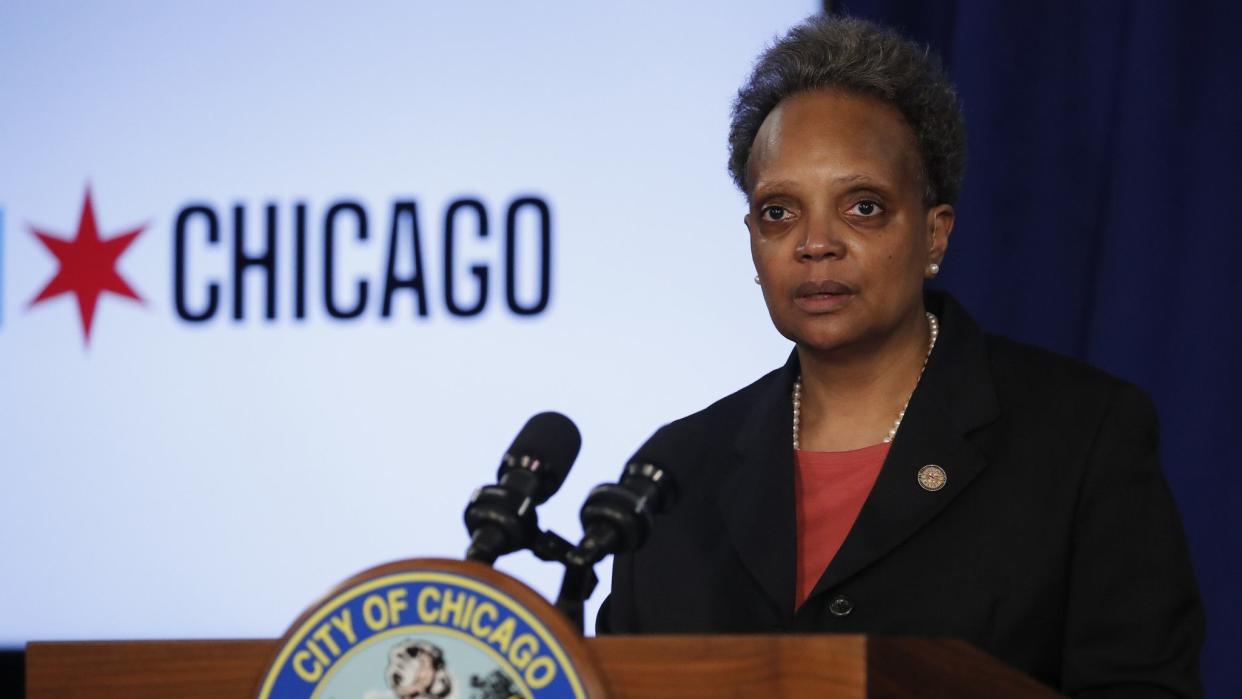Following similar moves in cities around US, Chicago's mayor declares systemic racism a public health crisis

- Oops!Something went wrong.Please try again later.
CHICAGO — Standing in front of a West Side exhibit honoring Martin Luther King Jr., Mayor Lori Lightfoot on Thursday followed the lead of several other cities around the country and declared systemic racism a public health crisis.
“When we think about racism, many of us think about its visible and audible forms,” Lightfoot said. “But the reality is, the insidious nature of systemic racism has other impacts that are every bit as deep and harmful but are often ones we can’t see, like impacts on the psyche and other impacts on our bodies that are just as, if not more, deadly.”
Racism tells people they’re lesser and puts a cap on their humanity, effectively destroying their perception of themselves and leaving people with depression, anxiety and anger, Lightfoot said. The life expectancy gap between white and Black residents in Chicago is more than nine years, she added.
“Ladies and gentlemen, it is literally killing us,” Lightfoot said.
Lightfoot made the declaration two years into her first term as the city’s first Black female mayor, and after the COVID-19 pandemic underscored Chicago’s racial health disparities.
Milwaukee County in Wisconsin in 2019 was among the first governmental entities to say racism was a public health crisis, and similar measures have been taken in cities including Denver, Columbus, Ohio, and Boston.
While the mayor’s announcement was largely symbolic, the city said it would spend $9 million from the federal Centers for Disease Control and Prevention on programs in six regions of the city to boost community wellness.
Since taking office in 2019, Lightfoot has sometimes favored ceremonial events or incremental actions that focus attention on broad issues, saying it’s important to discuss big problems even if solutions aren’t readily available.
In February 2020, for instance, Lightfoot hosted a so-called poverty summit aimed at bringing attention to deeply entrenched poverty in Chicago. Some community activists slammed Lightfoot’s efforts to address poverty as incomplete and largely symbolic and said she left out key groups from her summit.
Still, the mayor’s comments about racism’s effect on public health come as her administration faces significant criticism over issues of race and equity.
Although Lightfoot campaigned on a platform of police accountability, for instance, she’s also been criticized for watering down a civilian oversight plan she once championed and for failing to fully comply with court-ordered reforms of the department. In Chicago, it’s most often Black and brown residents who are killed by police or have other negative interactions with law enforcement, a reality Lightfoot has often acknowledged.
Black and Latino people account for more than 9 out of 10 arrests and uses of force by police, a disparity just as pronounced as it was under her predecessor, Rahm Emanuel, a Chicago Tribune investigation found.
In recent weeks, Lightfoot has also delayed a decision about issuing a permit for a scrap shredding operation to move from the edges of Lincoln Park to the predominantly Latino and Black 10th Ward, but has faced criticism for not stopping the plan.
Activists have complained about the proposal to move General Iron equipment to the Southeast Side and were recently joined by Michael Regan, the new U.S. Environmental Protection Agency administrator, who raised concerns about locating another polluter in a heavily industrialized neighborhood where people already breathe some of the city’s dirtiest air.
City officials also are facing scrutiny from U.S. Department of Housing and Urban Development. In response to a petition from community groups, HUD launched a civil rights investigation last year focusing on city ordinances that protect industries in certain parts of Chicago without consideration of the health and well-being of people who live nearby.
Still, the mayor has earned praise for how she handled some issues around race, like vaccine distribution. The city’s earliest distribution of vaccines disproportionately went to white people, but the administration worked to ensure Black and brown residents got their doses.
Aldermen on Wednesday also advanced a Lightfoot administration proposal to direct about $30 million in federal COVID-19 funds toward programs designed to address health disparities in underserved Chicago neighborhoods.
———
(Chicago Tribune’s John Byrne contributed to this report.)

